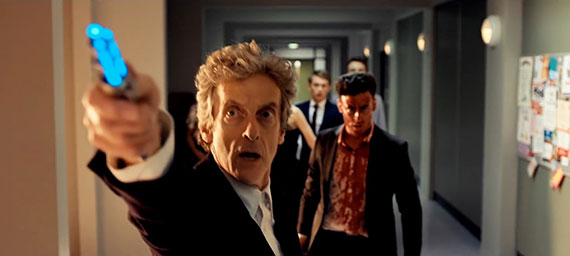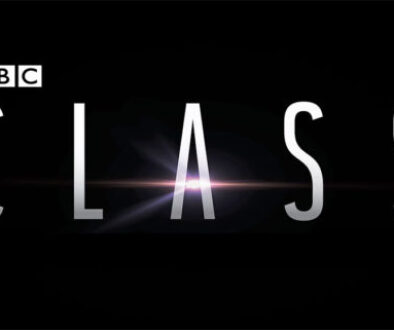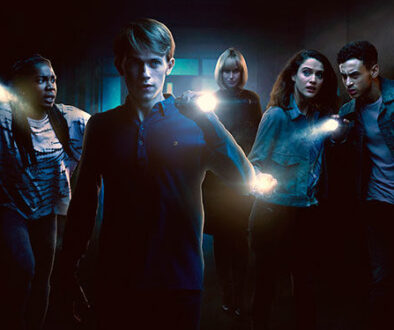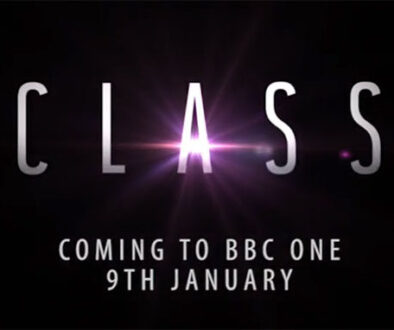Class: Episode 1 “For Tonight We Might Die” Review

Clint Hassell gives his verdict on Doctor Who’s new spin-off.
Note: this review contains full spoilers for the first episode.
How can one describe the plot of new Doctor Who spin-off series, Class? “A team must defend Earth from alien creatures that emerge through a rift in spacetime.”
No, wait – – that is the summary of the first two series of Torchwood.
Trying again: “Students protect their community from extraterrestrial threats which seem thematically linked to the teen-related emotional development or interpersonal problems they are having that week.”
That sounds exactly like The Sarah Jane Adventures, doesn’t it?
What can be said about Class that hasn’t already been said about previous spin-offs Torchwood or The Sarah Jane Adventures? Nothing. Because Class doesn’t contain a single original idea.
Class even pulls its main characters directly from Torchwood and The Sarah Jane Adventures, lifting their personalities unmodified from other series. Luke Smith from The Sarah Jane Adventures becomes Charlie, both socially inept because of their alien natures – – Charlie even completing Luke’s planned coming out storyline. Ram, so full of bravado and indifference, and Tanya, whose brilliance has eclipsed her social development, mirror exactly Owen Harper and Toshiko Sato from Torchwood, the two even mimicking Owen and Tosh’s she-likes-him/he-needs-her working relationship. Miracle Day’s Esther Drummond, eternally positive and nice-to-a-fault, gets reinterpreted as April, for Class.

This is not necessarily a complaint. In its first two series, Torchwood effectively used its science fiction premise to mine the emotional depths of its very human characters, before expanding in its third and fourth series to grapple with more ambitious topics including human corruptibility and mortality, and societal constructs such as faith and mass behavior. The children on The Sarah Jane Adventures grew into some of the most consistently well-written characters across any of the Who-related series. To see Class hew so closely to what has come before is evidence that the series has the potential to evolve into something that eschews mere “space and time” to investigate the humanity inherent in us all – – the defining trait of great science fiction.
However, Class isn’t quite there, yet, though its first episode certainly shows promise for the future. The concept of a gun that, by definition, kills both its intended target and the shooter is thought-provoking. How could such technology not cut down on the number of gun-related acts of violence and limit the use of guns to war? Under what circumstances would you be willing to pull the trigger, knowing that it meant you would also die?
Further, by presenting the Rhodia/Quill conflict from two opposing points of view, Class draws parallels between the series’ sci-fi narrative and the real-world political climate. If a nation helps an impoverished or war-torn country in need, but does so only on their own terms, and in a way that benefits them in the long term, are they really benefactors? If everyone is the hero of their own story, then what is the difference between a “freedom fighter” and a “terrorist”? The debate is fascinating, and it is to Class’ credit that it introduces civics to its young adult audience in such a palatable way. Note that the Doctor doesn’t pass judgement on Miss Quill for her “crimes” against the Rhodia, but for being complicit in the death of Kevin Williams. Note also that the Rhodia and the Quill were so busy fighting each other that they didn’t see the invading Shadow Kin until it was too late.

In fairness, many of the problems in “For Tonight We May Die” stem from the fact that, as Class’ first episode, it has a lot to establish in the way of setting, characters, and plot. Many of the narrative shortcuts – – Tanya, a math genius, doesn’t know her own address; Ram owns at least six flashlights; Quill’s gun is also a medical scanner – – are almost necessary due to the amount of information that needs to be conveyed in a mere 50 minutes. Why is April still hanging prom advertisements the day before the dance? Because it organically introduces the setting for the third act, without resorting to unnecessary exposition. Why is no one from student government helping April decorate for prom? Because it helps establish how April’s desire to be dependable allows her to be exploited. Note that the girl who feels invisible literally can’t get anyone to pay attention to her, despite warning her classmates of imminent mortal danger, in the episode’s third act.

Unfortunately, perhaps Class’ biggest obstacle to success is its ties to parent series Doctor Who. It is difficult to find originality in an episode that not only blatantly amalgamates both of modern Who’s spin-offs, but also appropriates the visual look of Doctor Who’s mysterious crack from Series 5; remarks that Charlie and Quill are the “last of their species”; incorporates a riff on “Doctor who?”; references artron energy, Clara Oswald, and Danny Pink; and practically begs the protagonists to “count the shadows.” Not only are the Shadow Kin strikingly similar in appearance to Series 4’s Pyrovilles, but Charlie has his own box that is “bigger on the inside.” While the initial appearance of the TARDIS is deftly handled – – the Doctor is not shown as his involvement is only important to the logistics of the plot and not to Charlie and Quill’s narrative – – the Doctor’s pivotal role in the episode’s final act actually hinders the development of the series’ characters. Tanya’s ingenuity, April’s willingness to sacrifice herself, and Ram’s bravery are all overshadowed by the first real use of the Doctor’s now-green-and-blue sonic screwdriver. While the producers certainly hoped that a cameo by the Doctor would drive Who’s legion of fans towards Class, it is a critical mistake for a new series asking us to become invested in its human characters.
This is important, because Class, like The Sarah Jane Adventures, plans to mine its teen characters for most of its emotional drama and storytelling opportunities. Not only is April debilitatingly nice, she is missing half her heart, is estranged from her dad, and must help care for her wheelchair-bound mom. Charlie is an orphaned victim of genocide, a prince, he is guarding the gateway to the Rhodian afterlife, and he’s gay. Ram and Tanya are both pressured by their single parents to achieve, Tanya having lost her dad to a stroke, and feeling out of place as a 14-year-old in a class of 17-year-olds, and Ram having witnessed the savage murder of his girlfriend, before having his leg chopped off. While this does provide much narrative fodder for future episodes – – while also providing the framework for complex, layered characters – – it does so in a contrived way that is only seen on TV. Class’ theme that teenagers encounter more problems than they can be expected to effectively manage is potent, but portrayed in a very heavy-handed fashion, in this initial episode.







